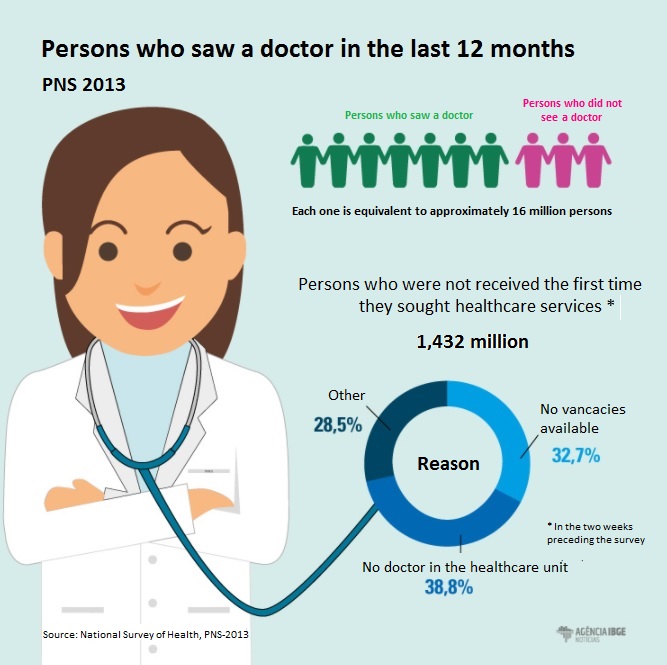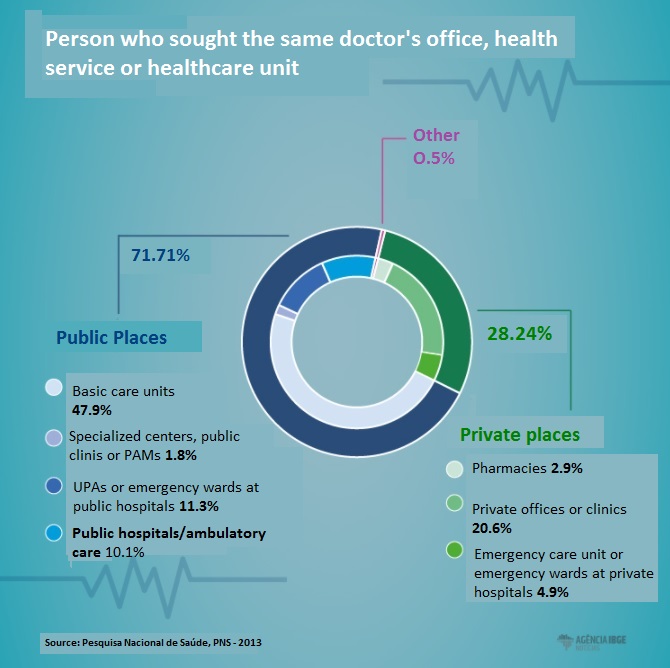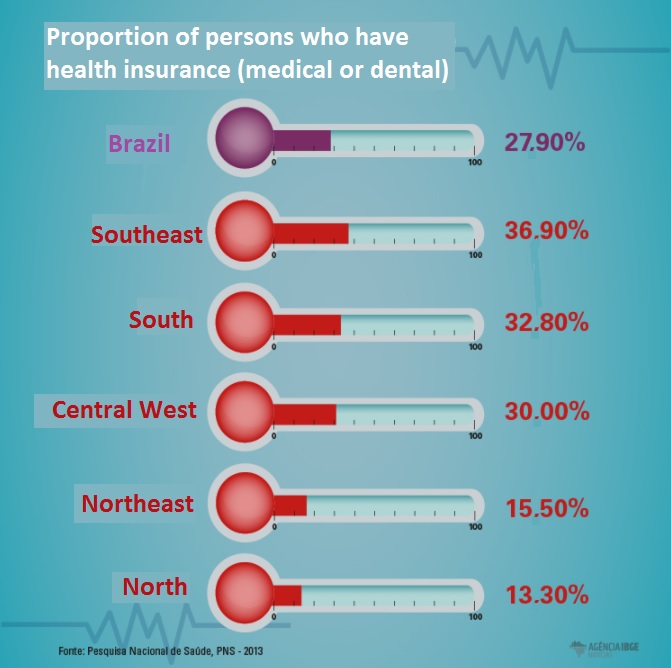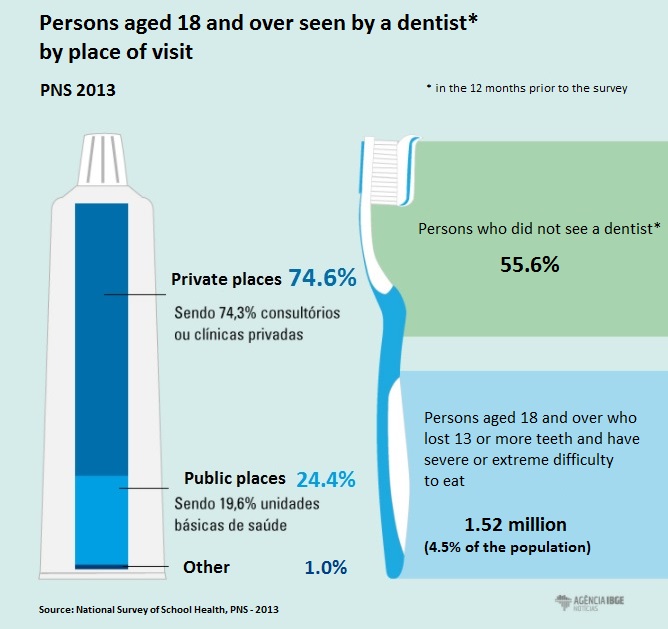Citizen Constitution: 30 years later
Health advances, but remains far from the 1988 plans
May 29, 2018 11h00 AM | Last Updated: June 05, 2018 04h17 PM
The 82nd anniversary of the IBGE is not the only important date celebrated by the Brazilian society in 2018: 30 years ago was promulgated the Federal Constitution of 1988, considered a landmark in terms of social rights in Brazil. For that reason, the IBGE News Agency starts, today, a series of special reports on the achievements brought by the Citizen Constitution, the first one being the position of health as a basic right.
Art. 196. Health is a right of all and a duty of the State, ensured by means of social and economic policies aimed at the reduction of disease risks and other grievances, and at the universal and equal access to actions and services for their promotion, protection and recovery.

With the acknowledgement of health as a right, the 1988 Constituion was responsible for a considerable expansion in the access to public medical services, mainly by the poorer classes. Although still not perfect, the Unified Health System (SUS) managed to reduce previously exixting deficiencies in the sector.
“We have expanded access, mainly for the poor and the population living out of big urban centers. We increased the supply of basic services, and that way we managed to reduce infant mortality, improved vaccination, besides leading to a significant decrease of some diseases", explains Marco Antônio Andreazzi, a doctor and reasearcher from the IBGE.
“SUS has some niches of excellence, places that can transplant kidneys, cornea and livers, being the third one of the most complex types, besides working on the control of AIDS”, recalls the researcher from the National School of Public Health from Fiocruz (Oswaldo Cruz Foundation) Isabela Santos. “We have had important changes in the last 30 years, but the real SUS is not like the ideal one. It still has many problems”, she adds.
Isabela also says that, although many rights have been granted after the Constitution, public health still has a long way to go. “The participation of the private sector in the provision of health services has grown since the military dictatorship. SUS has grown, but always facing competition by the private sector. Also, SUS was not properly funded by any gobvernment after 1988. We still do not have the system we would like to”, says the researcher.
“Access is not equal. In theory it is, but, in fact, citizens who can afford health insurance will do that; those who cannot, use SUS”, Ms. Santos highlights. “That difference in access is a discrepancy that was not created by the SUS, but that could not be prevented”, adds Dr. Andreazzi.

Interstingly enough, the advances in basic health also brought new challenges. The reduction of child mortality and the increase of life expectancy have led to an increased demand for complex services related to population ageing.
“Chronic and degenerative diseases increased and now require more complex monitoring, and that represents a bottleneck in our system, one that tends to become more serious”, says Dr. Andreazzi. He also recalls that the 2009 edition of the IBGE's Survey on Medical and Sanitary Assistance (AMS) already reported a reduction in the absolute number of beds since 1988. In the year of the Constitution, there were more than 527 thousand beds, which fell to below 432 thousand in 2009, 81% of the starting figure.
| Number of beds for inpatient care in health establishments | |||
| Brazil | |||
| Year | Administrative sphere | ||
| Total | Public | Private | |
| 1988 | 527196 | 120776 | 406420 |
| 1999 | 484945 | 143074 | 341871 |
| 2009 | 431996 | 152892 | 279104 |
| Source: IBGE - Pesquisa de Assistência Médico-Sanitária | |||
Rights not guaranteed
Although it meant an advance in the fight against primary issues of nationa health, the 1988 Constitution did not solve the lack of access to more complex services. Even having legal rights, many families do not receive proper care in the public health system, as it is the case of Oliveiro Brizio Filho, age 60, the brother of Regina and Sandra, residents of Engenho Novo, in Rio de Janeiro.
Suffering from renal insufficiency and pneumonia, the retired man, who is currently working for an elevator company, needed to be hospitalized in an improvised area in a basic healthcare unit for eight days until he was finally transferred to an intensive care unit in a hospital.
Sandra (on the left) and Regina are Oliveiro's (age 60) sisters
“The doctor said he could not stay there because he needed to undergo haemodialysis", says Regina, who is a lawyer. “She said we wold need an injunction to find a bed in a public hospital. We searched for legal emergency services and were given a document forcing the health secreatariat to hopipitalize my brother in a period of 27 hour at most. What happened then? Nothing”, says one of Oliveiro's sisters. He also has three brothers and two daughters. “Those injunctions have no value, becuase there are no beds available”, Sandra adds.
After spending more than seven hours at the courthouse, Regina was given a second document listing three private hospitals for her brother's hospitalization, but it was no use. “He spent eight days at the UPA (Emergency Care Unit), and left the place almost dead. But I cannot complain about the doctors and other professionals. They did their best, but there was no equipment. It was a miracle ny brother got cured. Those are real doctors”, recalla the lawyer, who had to count on the help from a friend to have her brother sent to a public hospital.
“I went to five or six hospitals. I begged everyone for help. I had never felt so happy to see someone hospitalized”, says Regina. “Now he undergoes haemodialysis every day. It cannot be interrupted because of his kidney failure. When we got to the hospital, they asked me how he had survived. He is still alive."

A necessary diagnosis
In order to identify what difficulties in the system lead to cases like this one, it is essential to build indicators in the health segment. That is the case of surveys like the National Survey of Health (PNS), which had its last edition in 2008 and that starts again in the second healf of the year. In addition to that, the National Survey of Health Demography (PNDS) and the National Survey of School Health (PeNSE) will have new editions soon.
“We will have the possibility of evaluating the sector. All that reflects the population's health conditions”, explains Dr. Andreazzi, who also highlighted the role played by the IBGE as a coordinator of indicators in the UN's Millennium Development Goals. “That's a contribution we can give. Household surveys allow monitoring of public policies in the area”, he adds.

The Fiocruz researcher Isabela Santos also highlights the importance of indicators. “It is more than fundamental, it is vital for the country to have those continuous surveys. That is the role of the IBGE and its know-how is fundamental. It is important for any government, regardless of its ideology. Conducting surveys on health issues is investing in the population, and being able to plan public policies”. She adds that “surveys on the access and use of health and the general conditions of the population are fundamental for the government to identify what is happening and to reformulate public policies.”
Nevertheless, much has yet to be done to guarantee the universal right to health dreamt of in 1988 does come true. “The Constitution states that is a right, but reality is still different”, Regina concludes.




















